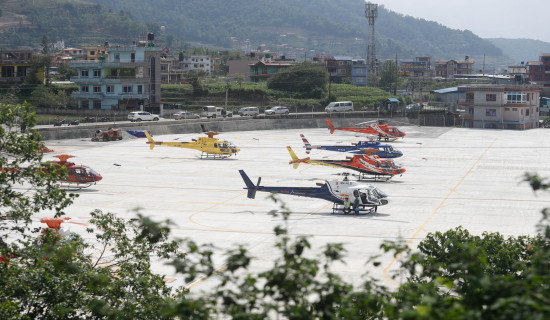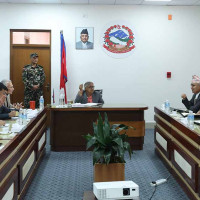- Thursday, 4 December 2025
‘Energy is basis of prosperity’
By A Staff Reporter,Kathmandu, Feb. 24: Newly appointed Director General of the Department of Electricity Development Jeebachha Mandal has said that energy is the basis of prosperity in the context of Nepal.
During a meeting with the representatives of the Independent Power Producers’ Association, Nepal (IPPAN) on Friday, DG Mandal said that the energy sector would be regarded successful only if the people involved in the energy sector and the country prospered together.
He said that hydroelectricity was the biggest door to prosperity. He further said that if the country did not prosper, and only individuals prospered, any sector could collapse at any time. Stating that he is aware of all the problems facing the private sector, Mandal assured that those problems could be solved with the joint efforts of the government and the private sector.
According to IPPAN, Mandal said that not only the private sector but also the Nepal Electricity Authority, which is an integral part of the government, was affected when the Ministry of Finance did not consult with the stakeholders while formulating the economic policy.
He also said that the Departments, NEA and the private sector should work together to solve the problems created due to the removal of discounts provided on spare parts. Recalling that hydropower project licenses were given for Rs. 150 until 2006, Mandal said that the license provisions could be amended regularly.
He recalled that when it came to building a project on the boot model with foreign investment, the term of the license was 35 years and said that he would take the initiative to maintain it for 50 years under the provisions of the Act. DG Mandal assured that he would initiate to increase the license period of the project from 35 years to 50 years.
Congratulating newly appointed DG Mandal, IPPAN President Ganesh Karki said that all obstacles faced by the private sector should be solved if the country truly wanted to generate 28,000 megawatts of electricity by 2035. “Otherwise, only 2,800 megawatts of electricity can be added instead of producing 28,000 MW,” he said.
Karki expressed his belief that the private sector would meet the government's goals if the energy development agencies supported the private sector by facilitating policies and laws.
“The government should bring down the design of hydropower projects from Q40 to Q25, according to the provisions in the Electricity Act, the permit period of the projects built by the Nepali private sector should be maintained for 50 years,” he said.
He said that the electricity generation period of the projects that could not be completed in time due to the financial crisis should be extended by two years for financial management. Karki said that the government should add two years more for financial closure.









-original-thumb.jpg)






